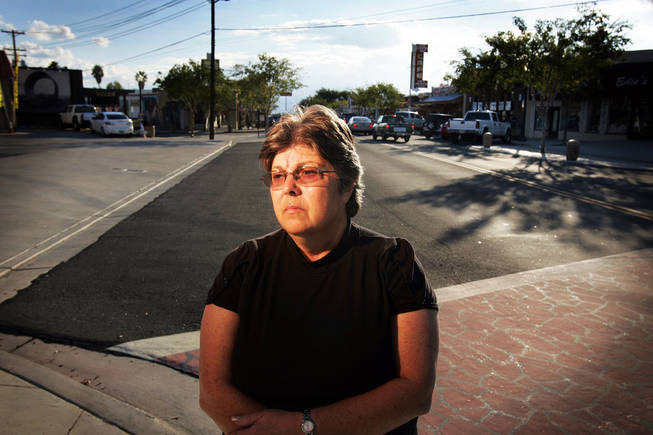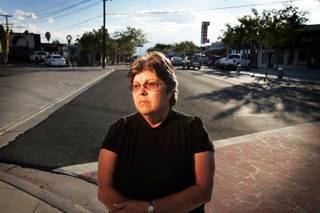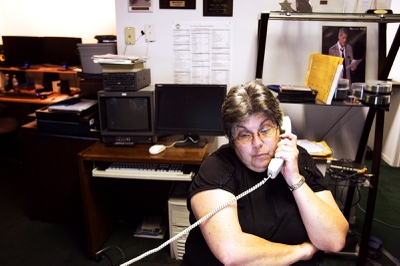
Boulder City public information officer Rose Ann Miele was working the cameras at a city council meeting Oct. 12 when a vote was taken to eliminate her position. Her last day is Dec. 1.
Monday, Oct. 25, 2010 | 2 a.m.
Sun Coverage
- Boulder City sends SolBio letter of default for missed $3 million payment (10-13-2010)
- Boulder City eliminates public information office, makes other cuts (10-13-2010)
- Public information office could be victim of Boulder City budget woes (10-9-2010)
- $3 million budget hole means Boulder City layoffs likely (10-5-10)
- Solar plant in Boulder City gets $2.9 million grant (2-18-2010)
- Boulder City finalizes deal for third solar power plant (6-12-2009)
- Sempra to expand solar power plant near Boulder City (4-15-2009)
- Gibbons dedicates solar plant near Boulder City (1-22-2009)
- Another solar power plant in the works for Boulder City (1-19-2009)
- Trash-to-power plans tabled (1-16-2009)
- Boulder City residents to pay more for electricity (1-6-2009)
- Solar power plant opens in Boulder City (1-5-2009)
- Solar firms seek land (12-24-2008)
Boulder City, born in the Great Depression as an encampment for dam construction workers, seemed to have made a seamless and logical transition to a new and very promising economy, leasing large swaths of city-owned land to solar energy investors.
It seemed a fitting destiny: A town founded on the construction of a dam to harness hydropower now maturing as a small city sustained by fields of photoelectric panels collecting the sun’s rays.
Clean-energy revenue would help the city make its payroll and help pay for the municipal pool, the animal shelter, the youth center, even the city’s public TV station.
In his State of the City address this year, Mayor Roger Tobler declared that solar energy plants had the potential “to help pull our city out of debt and provide for our future.”
The Sol Bio solar plant would be the fifth and largest of the solar energy facilities coming to Boulder City, being erected on a dry lake bed in Eldorado Valley on the fringe of town. And it would contribute $2.4 million to the city coffers — covering almost 10 percent of the city’s operating budget.
But today the city is red-faced with anger and frustration. Plans for the Sol Bio facility have collapsed for want of financing, leaving Boulder City the victim of a cruel betrayal.
And the toll is measured not just in the reduction or loss of services, but the layoffs of city employees who were nothing short of family, warm souls in a city that prided itself on its intimacy and connection with the townspeople.
“My frustration is we’re dealing with individuals’ livelihoods,” Councilman Cam Walker said.
Rose Ann Miele, the city’s public information officer, was beside herself with anxiety while waiting for the City Council to decide who would need to be laid off. “I can’t take it anymore,” she said this month. “I have to be here, and I have to do all my jobs, not knowing if I’ll have a job next week or not.”
The shoe dropped Oct. 12. Miele was working the cameras at a city council meeting when it voted to eliminate her job. Rather than take a severe pay cut, she chose to retire. She leaves Dec. 1.
The other two city employees facing termination — Debbie Barth, who runs the youth center, and Robin Kariam, who has run the arts center for 13 years — are safe for now.
The anxiety was palpable for Kariam. “It’s like an empty pit in my stomach,” she said. “You feel like you’ve never been appreciated.”
This is how budget cuts are emotionally processed — as changing the lives of real people, not just refiguring numbers on a computer spread sheet.
The numbers are simple: For the city’s 2011 general-fund budget, revenue from four solar project leases, along with projected income from the Sol Bio facility, accounted for 14 percent, $3.8 million, of the $26.6 million spending plan.
Solar was providing the promise of future revenue when traditional sources have been decimated. For instance:
• The city expects to make $30,000 in hotel room taxes in 2011 — a mere fraction of the $462,000 those taxes generated in 2006, because of plummeting tourism.
• The city expects to make less than $30,000 on building and zoning fees, compared with $220,000 in 2006, because of the drop in development.
So solar revenue — which is making more money for the city than property taxes and fees for various city services — is coming just in time.
Of the $3.8 million projected revenue in solar leases, $2.4 million was to come from Sol Bio, which planned to build a $2 billion solar panel power plant on 2,200 acres. The city and the company signed a 40-year lease on Dec. 8 with payments starting in fiscal year 2011, which began in June.
However, the company went into default on those payments as soon as the first due date arrived in March because it had not secured financial backing for the project.
Throughout the spring and summer, David Irwin, Sol Bio president and CEO, reassured City Manager Vicki Mayes and the council via e-mail that he was working tirelessly to find investors.
Irwin, who did not respond to Sun requests for an interview, told the city Oct. 5 that he has hope for two potential investors, only to inform the city since then the deals had faltered.
Mayes, Tobler and Walker said they knew in December that Sol Bio’s plan might fall through. With solar projects, nothing is certain until the ground has been broken, Mayes said. Still, in these tough times, they found themselves counting on Sol Bio to perform.
Sol Bio is a Delaware-registered limited liability company, and the Boulder City project would have been its first. Irwin also owns Green Tech Solar, a company registered in British Columbia, although neither has completed a solar power plant of this magnitude, Mayes said.
Despite Irwin’s assurances, officials began to suspect he would not succeed. As the city scrambled to make up the difference, the missing payments became a gaping hole.
In August, Mayes outlined three phases of cuts to fill it. The first step froze capital spending and hiring beginning Sept. 1 to save about $315,000.
At its Oct. 12 meeting, the council considered a slew of cuts to save $350,000 or more in the second phase. Some possibilities included closing the swimming pool, suspending activities at the youth center and art center — causing Kariam and Barth to lose their jobs — and shutting down the city’s TV station, laying off Miele in the process.
In its final vote, the council eliminated Miele’s position, cut hours of operation at the swimming pool and reduced maintenance at the city’s two golf courses. For now, the art center and the youth center will stay.
A third phase of cuts is slated for November, and Mayes has said that more layoffs might be necessary. She wouldn’t be specific.
Kariam, who makes $32,000 annually for working 32 hours a week, said recent months have been very stressful. The center has been forced to increase fees for classes and turn people away who have regularly attended because they couldn’t afford it.
Moreover, she said she’s in no position to lose her job. With mortgage payments, Kariam described the fear of being laid off as “devastating.”
Barth and Miele have similar stories. Barth, who has run the cottage that serves as the youth center in ABC Park for eight years, said after the center began charging $20 a year for after-school programs, attendance dropped from about 60 children a day to 15.
“You kind of take it personally,” said Barth, who is paid $37,000 a year for 32 hours a week. “I don’t go home and just forget about it.”
Miele, who makes $75,000 a year, agreed. She has been the city spokeswoman for 10 years, and said it was surreal to listen to the council and the public debate whether it was “worth it” to keep her job. “It’s unnerving,” she said.
Before it started cutting jobs, the city had taken some easier routes for budget reductions. The police department declined its annual cost-of-living increase twice to help the city; positions have been held open, and miscellaneous expenditures have been cut.
Possibly making matters worse, funding from the state to local governments is anticipated to drop drastically as the Legislature tries to fix its $3 billion deficit.
Boulder City sent Sol Bio a letter of default in October, but it’s unlikely that the city will take legal action, City Attorney Dave Olsen said. Instead, Mayes will seek a lease with another company.
Officials are confident that solar power still holds promise for mending the city’s budget holes. So the search for the next project continues.
“I just move forward,” Mayes said.



Join the Discussion:
Check this out for a full explanation of our conversion to the LiveFyre commenting system and instructions on how to sign up for an account.
Full comments policy